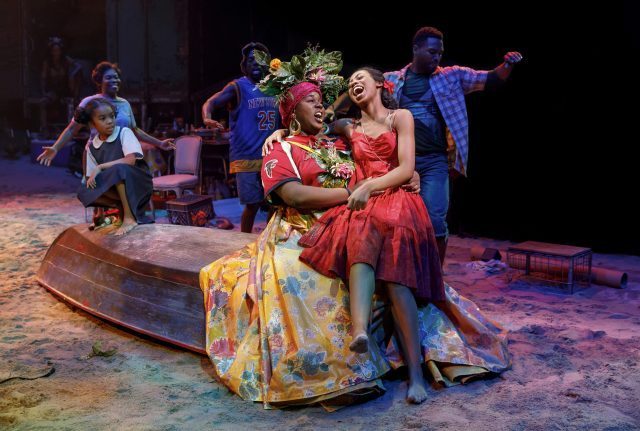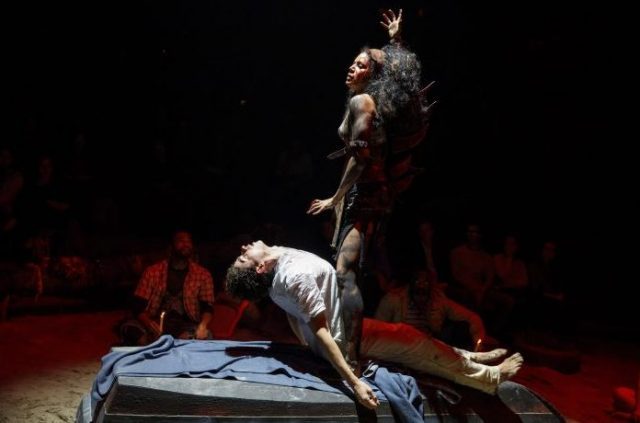
Once on This Island revival should have been dead in the water (photo © Joan Marcus 2017)
Circle in the Square Theatre
1633 Broadway at 50th St.
Friday – Wednesday through December 30, $89.50 – $189.50
onceonthisisla nd.com
Michael Arden’s revival of Lynn Ahrens and Stephen Flaherty’s 1990 hit musical, Once on This Island, is a critical and popular success, blowing away audiences with a stellar cast, superb staging, lively music, and a fantastic set that takes full advantage of the small Circle in the Square Theatre. There’s only one problem, and it’s more than a minor quibble: The story is culturally insensitive, racist, colonialist, and, as far as subject matter goes, tone deaf. Nominated for eight Tonys during its 1990-91 Broadway run and winner of the 1994 Olivier Award for Best New Musical, the show takes place in the “Jewel of the Antilles,” the former French colony known as Saint-Domingue before becoming Haiti. In the prologue, various characters describe their home as “an island where the poorest of peasants labor” and “the wealthiest of grands hommes play.” One woman says, “The grands hommes, with their pale brown skins and their French ways, owners of the land and masters of their own fates,” after which a man adds, “And the peasants, black as night, eternally at the mercy of the wind and the sea.” Thus, the central dilemma is set up, class warfare based on skin shade. The poor side of the island is overseen by a quartet of gods: Papa Ge, the sly Demon of Death (Merle Dandridge), Erzulie, the beautiful Goddess of Love (Lea Salonga), Agwe, God of Water (Quentin Earl Darrington), and Asaka, Mother of the Earth (Kenita R. Miller). Following a flood, little Ti Moune (Emerson Davis) is protected by a tree near a small, close-knit village, where she is taken in and raised by Mama Euralie (Kenita R. Miller) and Tonton Julian (Phillip Boykin). Grown into a lovely young woman, Ti Moune (Hailey Kilgore) sees an exciting stranger in a white car racing past and asks the gods for a glimpse of the man. When he later gets into a car accident and is saved by Ti Moune, she learns that he is Daniel Beauxhomme (Isaac Powell), the scion of the wealthy family that lives behind the gate on the other side of the island. As she nurses him back to health, she falls in love with him, but his family is against his having any kind of relationship with a peasant girl, ultimately leading to tragedy.

Papa Ge (Merle Dandridge) has a surprise for Daniel Beauxhomme (Isaac Powell) in Once on This Island (photo © Joan Marcus 2017)
In Once Upon This Island, William Shakespeare’s Romeo and Juliet meets Shel Silverstein’s The Giving Tree, with bits of Cinderella and Maid in Manhattan, only without any kind of legitimately believable romance and conflict. The narrative is told like a children’s bedtime story despite its adult themes of sex, power, class, and race. Kilgore is valiant as the older Ti Moune, Darrington is bold and strong as Agwe, and Dandridge is deliciously devilish as Papa Ge, while Dane Laffrey’s set boasts a mystical pond, a live goat, an overturned rowboat, plants, a large truck, drying clothes, and lots of sand, home to a close-knit community, the villagers dressed in Clint Ramos’s colorful costumes and moving to Camille A. Brown’s choreography. (Some of the characters also make their way into the audience.) The small band consists of Alvin Hough Jr. and Javier Diaz on percussion, Irio O’Farrill Jr. on bass, Hidayat Honari on guitar and mandolin, and Cassondra James on flute, performing Flaherty’s Caribbean-tinged music, but it’s the book and lyrics by Ahrens that are befuddling. Ti Moune is portrayed as some kind of legendary heroic figure willing to do anything for true love, but instead she’s just another victim of colonialism and racism, in this case celebrated for all the wrong reasons. Arden (Spring Awakening) and the creative team visited Haiti to get a better feel for its people and culture, even taking part in a Vodou ceremony, but what he’s delivered onstage is more like a knife in the back, particularly now that the president of the United States has offered his own take on the country. (Just wait till you see the shadow-puppet tale and the party dancing scene.) In his director’s note, Arden writes, “It is my hope that the story of Ti Moune might inspire any person, regardless of age, gender, race, ability, sexuality, or circumstance, to become a catalyst for change.” It’s my hope that more theatergoers see this sordid tale for what it really is, a perpetuation of stereotypes and genre clichés that prevent us all from moving forward and achieving real equality and sensitivity.